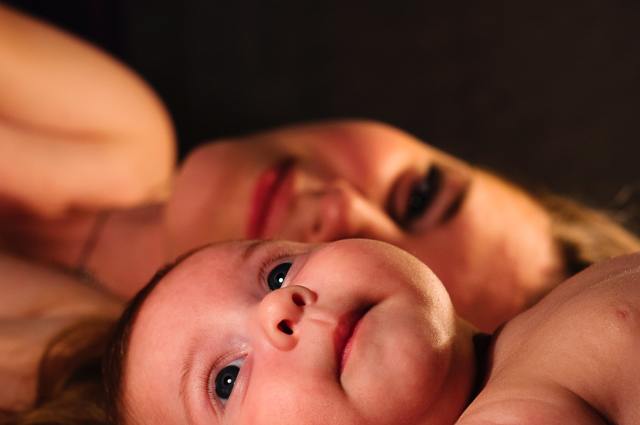We all know parents are warriors who can work miracles on very little sleep. But we’re also human, and humans need support sometimes. These online resources can connect you with experts, answer your questions, calm your mind, and provide valuable help to you and your baby.

The Lactation Network
Get the breastfeeding support you need, including 100% health insurance-covered consultations with lactation consultants (in-home, in-office or telehealth), help choosing a breast pump, and lots of useful articles to support your nursing journey.
New Kind
Get one-on-one newborn support from certified postpartum doulas with years of experience in feeding, sleep and postpartum issues. Pick a plan, then get matched with an expert and meet them by video call.
Pregnancy After Loss Support (PALS)
This nonprofit organization provides parents expecting rainbow babies with online support groups, in-person local groups, and an app with a milestone tracker, community support, self-care and coping tools and more.
pumpspotting
This breastfeeding app gives you access to experts for virtual consultations and connects you with a community of parents living that nursing life. Read articles tailored to your experience, based on baby's due date and the date you go back to work. There's even a crowdsourced map of places to nurse and pump, with ratings and photos.
Cluster
Get answers to all your questions about feeding your baby on Cluster, in a judgment-free, peer-powered community. Brought to you by baby nutrition company ByHeart, Cluster can set you up with appointments, classes and events with experts in the field, along with ways to connect with other parents with similar feeding concerns. Whether you're bottlefeeding or breastfeeding, you'll find answers about feeding and sleep, breast issues, setting schedules, baby digestive issues, bonding, self-care and more.
Motherfigure
This maternal wellness startup is committed to supporting mothers through pregnancy, childbirth and raising children through providing them access to care and education. Find childbirth education classes (online or in person); search for doulas, lactation consultants and more in your area; shop for maternity and nursing clothes; and read lots of first-person accounts and reviews.

Exhale Parent
This educational resource gives new parents and parents-to-be the legal and financial information they need. If you have questions about topics such as maximizing paternal leave, writing a contract for a caretaker for your child, budgeting, creating a will or choosing a 529 plan, Exhale Parent can help. The site breaks down topics so they're easier to understand and lets you know the steps involved so you can tackle them efficiently.
boober
Founded by a doula, this online marketplace helps expectant and new parents find high-quality classes on childbirth and postpartum support (topics include infant CPR, pumping and newborn sleep), as well as vetted, expert maternal care providers, including lactation consultants, doulas and mental health therapists. Sessions are held in-person or virtually and include free live webinars.
Postpartum Support International
This organization offers online support groups, helplines & text services for new and expecting moms to help manage postpartum stress, isolation, anxiety and depression. Call or text the helpline 24/7 to leave a message that will be answered by a trained volunteer. There are weekly online support meetings for a variety of groups, including: pregnancy mood support, perinatal mood support, NICU parents, military moms, pregnancy and infant loss, and black mothers. Dads can also call for support or attend the monthly Just for Dads chat.
Parent Lab
Parent Lab offers online parenting courses (online or audio) on a variety of topics geared toward new parents, including dealing with anxiety, increasing quality time, screen time guidance, sleep, and coparenting. The team of experts includes child development experts, behavioral experts and parent coaches.
Nurture by NAPS
Founded by two labor-and-delivery nurses, who are also moms, Nurture by NAPS is a subscription service that offers evidence-based, instructional content on pregnancy through the first year of a child's life, including videos from medical professionals, live webinars, weekly live Q&A sessions, and the ability to ask nurses questions and receive an answer within 24 hours.

Tinyhood
Tinyhood is an app and website that provides advice and support to parents and parents-to-be. Through live online parenting classes and one-on-one consultations with experts, Tinyhood tackles a ton of topics, including developmental milestones, sleep, introducing solid foods, breastfeeding, your postpartum health and more. The experts range from certified lactation consultants and sleep consultants to pediatric nutritionists and potty-training specialists.
Major Care
If you need support as you care for your new baby, consider a doula service like Major Care. This organization matches moms with a certified postpartum doula that can provide 24/7 virtual postpartum care and support. This includes lactation, pumping, perinatal body care, vaginal healing and mood disorder screening and resources. You choose whether you want the services to begin before or after your little one arrives.
Tot Squad
This service offers virtual sessions with experts on home safety, sleep issues, lactation, car seat installation checks and doula services (prenatal, early labor and postpartum).
FoodSafety.gov
This government website lists exactly which foods pregnant women should avoid and why. There's also a handy graphic you can print out to make it easier.

La Leche League International
This nonprofit organization provides education, training and advocacy around breastfeeding. There's extensive information on the website on issues related to breastfeeding, including food allergies, biting, caffeine, alcohol, mastitis, oversupply, reflux, tongue ties, vitamins and weight loss.
Kelly Mom
Kelly Mom provides tons of helpful, evidence-based information around breastfeeding, parenting, health and nutrition. Founded by a lactation consultant, the site is organized by topic (including pregnancy and ages & stages), so you can find the information you need.
Healthy Children.org
This website from the American Academy of Pediatrics hosts articles prenatal and baby information on a variety of topics. It covers milestones, nutrition, emotional wellness, immunizations, safety, family dynamics and health issues, all from a medical perspective.
Heal
Talk to doctors using phone or video chat. The video chat happens within the Heal app so there's no additional software to download aside from the app. Doctors can order labs, write prescriptions, and refer you to specialists, making it easy for you to get remote care from the comfort of your own home. Heal also provides mental health services from doctors of clinical psychology. Covered by many health insurance plans (check for yours on the Heal website). Currently available in the following states: Georgia, Maryland, New Jersey, New York, Virginia, Washington and Washington, D.C.
—Eva Ingvarson Cerise
RELATED STORIES:
10 Pregnancy & Parenting Podcasts to Start Listening to Now
26 Cheat Sheets Every Pregnant & New Mama Needs
Advice to New Moms from Moms Who’ve Been There











